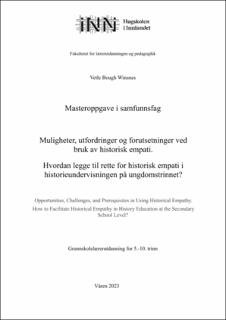| dc.contributor.advisor | | |
| dc.contributor.author | Winsnes, Vetle Bough | |
| dc.date.accessioned | 2023-06-24T16:10:14Z | |
| dc.date.available | 2023-06-24T16:10:14Z | |
| dc.date.issued | 2023 | |
| dc.identifier | no.inn:inspera:136493732:37399367 | |
| dc.identifier.uri | https://hdl.handle.net/11250/3073024 | |
| dc.description.abstract | I denne masteroppgaven er det sett nærmere på hvilket potensial som ligger i det å benytte historisk empati i historieundervisningen. For å besvare forskningsprosjektets problemstilling ble det utarbeidet to forskningsspørsmål som har tatt for seg muligheter og utfordringer som historisk empati kan gi, og hvilke forutsetninger som bør være til stede for å utnytte potensialet ved bruk av historisk empati i historieundervisningen. Det ble benyttet et kvalitativt studie med intervju av fem samfunnsfagslærere for å besvare forskningsspørsmålene, i tillegg til et relevant litteraturstudie av eksisterende forskning. Forskningsprosjektet er avgrenset til å kun fokusere på den potensielle gevinsten som kan fremkomme ved utvikling av historisk empati som et tiltak for å øke kvaliteten på studiet.
Forskningsprosjektet i denne oppgaven avdekker de sentrale mulighetene ved å innføre historisk empati historieundervisningen. Det kom frem at de mest sentrale mulighetene ved innføring av historisk empati i historieundervisningen er at det gir elevene en dypere forståelse for historiske kontekster og at det kan bidra til å utdanne aktive medborgere som kan bidra til demokratiets videreutvikling. De største utfordringene som ble identifisert var tvetydigheten ved historisk empati, og at det mangler et rammeverk for hvordan lærere kan tilpasse undervisningen slik at elevene kan utvikle historisk empati. I lys av informantenes svar og tidligere forskning ble det utformet seks forutsetninger for å utnytte potensialet ved bruk av historisk empati i historieundervisningen. Det er derfor som en del av forskningsprosjektet utformet et rammeverk som skal være tilpasset lærere som jobber med historieundervisning i norsk skole. Rammeverket er strukturert som en iterativ prosess med seks kognitiv-affektive elementer som legger til rette for utvikling av historisk empati. Det som skiller dette rammeverket fra tidligere rammeverk er at elementene er strukturert i en prosess, noe som systematiserer og forenkler bruken for lærerne.
Forskningsprosjektet fører med seg helt ny kunnskap og forståelse for potensialet i økt bruk av historisk empati. Videre oppfordres det på grunnlag av alle fordelene som kommer frem i oppgaven å forske videre på historisk empati, da dette kan ha en sentral rolle i å virkelig forbedre historieundervisningen. | |
| dc.description.abstract | The title of this master's thesis is “Opportunities, challenges, and prerequisites in using historical empathy. How to facilitate historical empathy in history education at the secondary school level?”. In this master's thesis, a closer look is taken at what potential lies in using historical empathy in history teaching. To answer the research project's problem statement, two research questions were developed, which addressed the possibilities and challenges that historical empathy can provide, as well as the prerequisites that should be in place to exploit the potential of using historical empathy in history education. A qualitative study with interviews of five social studies teachers was used to answer the research questions, in addition to a relevant literature study of existing research. The research project is limited to focusing only on the potential benefits that can arise from the development of historical empathy as a measure to improve the quality of education.
The research project in this thesis reveals the key opportunities of introducing historical empathy in history education. It was found that the central benefits of incorporating historical empathy in history education are providing students with a deeper understanding of historical contexts and fostering the development of active citizens who can contribute to the further advancement of democracy. The main challenges identified include the ambiguity surrounding the concept of historical empathy and the lack of a framework to guide teachers in adapting their instruction to cultivate historical empathy in students. In light of the participants' responses and previous research, six prerequisites were formulated to harness the potential of using historical empathy in history education. As part of the research project, a framework tailored for teachers in Norwegian schools was developed. The framework is structured as an iterative process with six cognitive-affective elements that facilitate the development of historical empathy. What sets this framework apart from previous ones is the systematic progression of the elements, which simplifies and streamlines its implementation for teachers.
The research project brings forth brand new knowledge and understanding of the potential in increased utilization of historical empathy. Furthermore, based on all the advantages highlighted in the thesis, there is an encouragement to further research on historical empathy, as it can play a pivotal role in truly enhancing history education. | |
| dc.language | nob | |
| dc.publisher | Inland Norway University | |
| dc.title | Muligheter, utfordringer og forutsetninger ved bruk av historisk empati.
Hvordan legge til rette for historisk empati i historieundervisningen på ungdomstrinnet? | |
| dc.type | Master thesis | |
